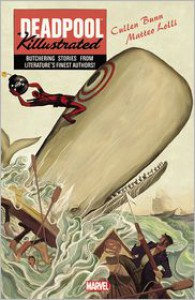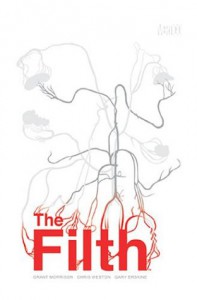Where to go for safety?



It's the place that Deadpool doesn't want to go to. It's the place he fears.*
*Other libraries may frighten him too, but you probably want to go to this specific one to be sure...
Far more intense than I expected!

This was, I assumed, a light take on Deadpool murdering the classics. References to how he did so in as gory as manner as possible. Like those retellings of the classics, just with Deadpool.
It's so, so much more than that. After he finds out he's a fictional character in Deadpool Kills the Marvel Universe, he figures he'll die after he kills everyone off. Except that he doesn't die, so he decides he needs to kill of the stories and ideas that spawned the Marvel universe and the characters within.
It's meta, it's a way to pay homage to the classics that did inspire the characters, and it's actually got a storyline that makes sense. It's amazing, and it made me thought about how I treat the characters when I read and thus interact with them.
Wonderful, rich stuff - which was just a bonus.
And y'know, Deadpool which is why I came in the first place.
The Filth by Grant Morrison

The Filth is outrageously strange, metaphorical giant that is doomed to leave no one cold. This multi-layered story is an excellent example of the graphic novel requiring more than one brain cell to reach the full comprehension, and because I only have half of the required brain cells, I sometimes felt as if being in a vacuum without the ability to understand the fine art of statement and criticism.
The Filth is observant intellectualism at its best, a one more reason for me to cry a river whenever hearing graphic novels should not be referred as an important part of literature.
How dare you, Grant Morrison, how dare you.

The Filth by Grant Morrison

The Filth is outrageously strange, metaphorical giant that is doomed to leave no one cold. This multi-layered story is an excellent example of the graphic novel requiring more than one brain cell to reach the full comprehension, and because I only have half of the required brain cells, I sometimes felt as if being in a vacuum without the ability to understand the fine art of statement and criticism.
The Filth is observant intellectualism at its best, a one more reason for me to cry a river whenever hearing graphic novels should not be referred as an important part of literature.
How dare you, Grant Morrison, how dare you.

Continues to be spectacular!

This series continues to be just absolutely amazing! It's more of a solo Groot issue, with a little Rocket in flashbacks, but it works, it fleshes out their past and friendship a little, and it sets up the next issue as well. And I can't wait for the next issue.
This was a quick read, partly due to the fact that single issues of comics are short, but mostly due to the fact that the art is gorgeous, and the dialogue is perfect for the characters: funny, in character, and mostly lighthearted with a strong focus on the friendship between Groot and Rocket.
Groot was always a character I liked, but mostly because he worked off Rocket. He worked with Rocket better than any other character I've seen, and so I was wary of this issue. Would Groot work on his own? Loveness does a lot with a character with very limited dialogue, showing a side to him that I hadn't considered: the desperation for contact, for being able to connect through people via speech. The search for someone who understands him.
Which, again, only underscores the friendship between Groot and Rocket, and why it works so well. Lovely, lovely issue. Recommended for any Guardians of the Galaxy, or even just Marvel, fan.
PS - one of my boys is on the cover. Vision is almost completely obscured by one of the boxes on the cover, but he's there!
 1
1
